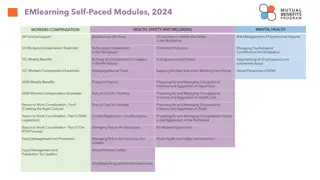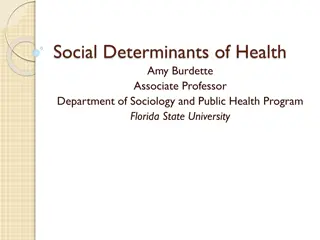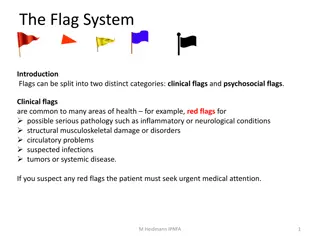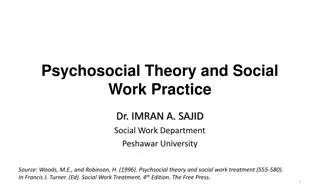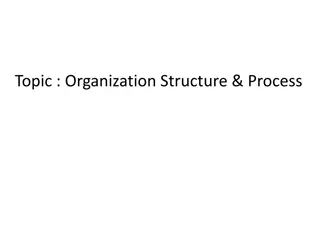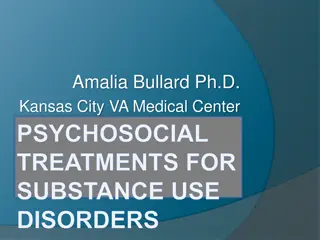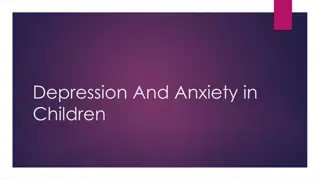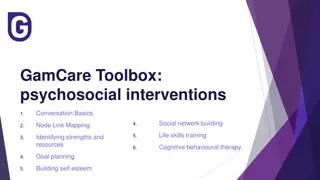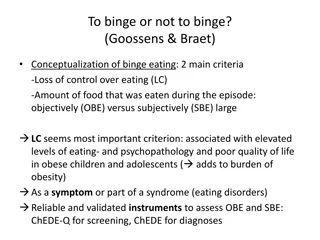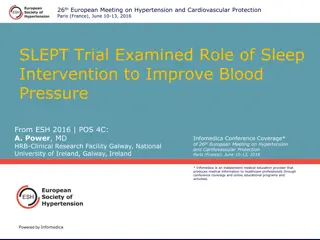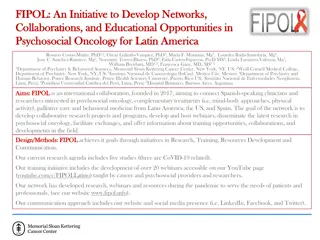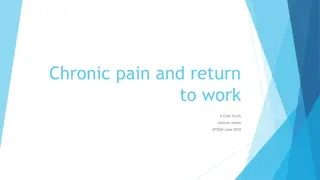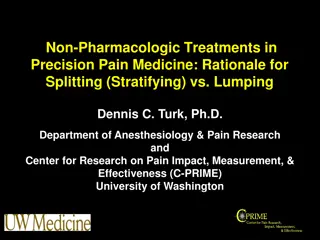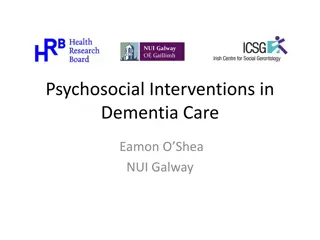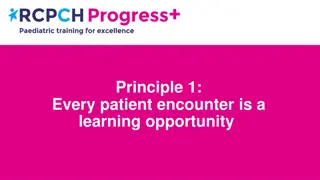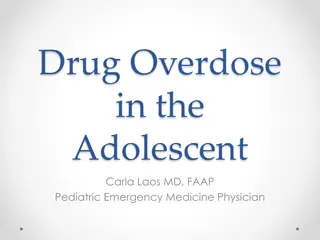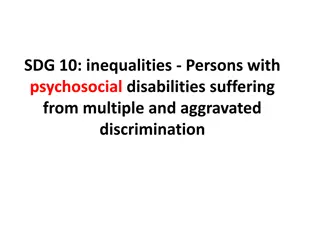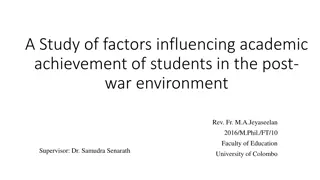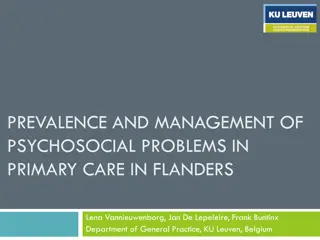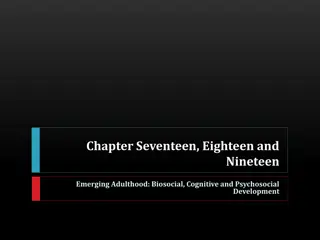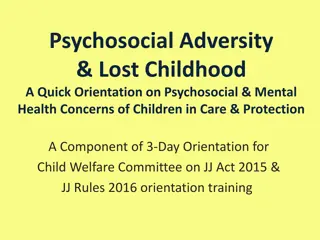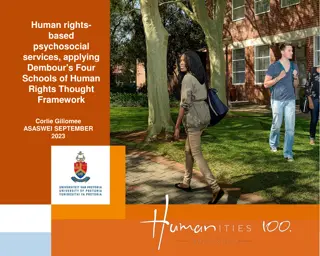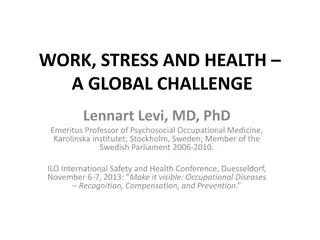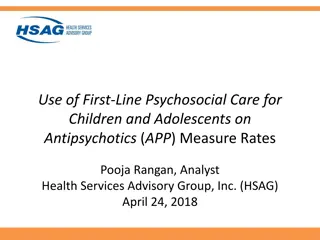Hospice 101
The history of hospice, the benefits it offers, and the care team involved in providing holistic end-of-life care. Learn about the Medicare hospice benefit and the various physical, psychosocial, and spiritual care management services available.
5 views • 28 slides
Strategies to Promote Mental Health in Schools
Schools play a crucial role in promoting mental health and well-being among students. By focusing on prevention, early intervention, and creating supportive environments, schools can help reduce school absenteeism, risky behaviors, and substance use. Six evidence-based strategies include providing p
2 views • 28 slides
Interpersonal factors and their impact on pain transitions
Exploring the impact of interpersonal factors on pain transitions, this research delves into the communication and behaviors between individuals experiencing pain, such as parent-child relationships and interactions with healthcare providers. The study analyzes psychosocial mechanisms influencing pa
3 views • 24 slides
Understanding and Managing Burnout in Oncology Care: A Path to Better Well-being and Quality Care
In the field of oncology care, the importance of effective management to reduce burnout among healthcare providers is highlighted. Stress, psychosocial risks, and burnout definitions are explored, emphasizing the impact on healthcare professionals' well-being and job satisfaction. Studies reveal hig
2 views • 69 slides
Support and Unity Initiatives by ASSOCIATION FOR THE SUPPORT AND ENCOURAGEMENT OF UNITY CROATIA
Founded in 2014, this association based in Croatia focuses on promoting equality, peacekeeping, demining activities, and social solidarity. Their main activities involve educating civilians on mine dangers, psychosocial empowerment of children, and international experiences with victims of war and v
1 views • 10 slides
Comprehensive Workplace Health and Safety Training Program for Professionals
Explore a wide range of self-paced modules covering topics such as mental health, workers' compensation, risk management of psychosocial hazards, bullying and harassment, injury prevention, and more. Enhance your knowledge and skills to create a safe and healthy workplace environment for employees.
2 views • 6 slides
Understanding Mental Deficiency: Causes and Classifications
Mental deficiency, also known as intellectual disability, is characterized by significantly below-average intellectual functioning before the age of 18, along with limitations in adaptive behaviors. It is measured using standardized IQ tests, with classifications ranging from profound to mild. Two m
3 views • 65 slides
Understanding Stress and Resilience in Older Adults
Explore the complex interplay between stress and resilience in older adults, examining models of physical and neurological resilience, recovery trajectories after hip fracture, and dynamic indicators of resilience. Considerations include psychosocial resilience factors like external support, social
0 views • 19 slides
Understanding Social Determinants of Health
Chronic conditions like heart disease and cancer have multiple causes, not all biological. Social epidemiology studies the social distribution of health, morbidity, and mortality risk influenced by social status and conditions. Factors such as age, gender, race, socioeconomic status, and social cond
0 views • 32 slides
The Flag System: Identifying Clinical and Psychosocial Flags in Health Settings
The Flag System categorizes flags into clinical and psychosocial categories, such as red flags for serious pathology and orange flags for mental health issues. Psychosocial flags like yellow, blue, and black identify factors affecting recovery and return-to-work processes. Screening tools like PHQ-2
4 views • 7 slides
Understanding Psychosocial Theory in Social Work Practice
Social work practice has always integrated psychosocial concepts to address human well-being and social functioning. Psychosocial caseworkers aim to help clients navigate challenges stemming from environmental imbalances. The term "psychosocial" refers to the interaction of psychological and societa
0 views • 27 slides
Understanding Organization Structure and Process
Organization structure is the formal arrangement of relationships within a firm, important for achieving objectives efficiently. It involves elements like job differentiation, integration, authority systems, and flow of information. The formal and informal organizational structures play distinct rol
5 views • 62 slides
Understanding Physical Changes in Old Age and Relevant Theories
Late adulthood, typically starting around age 65, is a period where individuals confront the psychosocial task of integrity versus despair. Geropsychology plays a vital role in studying aging and providing clinical support. Erikson's ninth stage of psychosocial development suggests that older adults
1 views • 14 slides
Psychosocial Treatments for Substance Use Disorders: Strategies and Interventions
Delve into the world of psychosocial treatments for substance use disorders with Dr. Amalia Bullard at Kansas City VA Medical Center. Explore empirical-supported interventions, motivational interviewing, cognitive behavioral therapies, and more to understand the mechanisms of change and the importan
1 views • 91 slides
Understanding Depression and Anxiety in Children
Depression and anxiety in children are serious mental health concerns that can impact their daily functioning and overall well-being. Childhood depression, if left untreated, can lead to long-term consequences. Recognizing the signs and symptoms of depression in children, such as irritability, socia
1 views • 18 slides
Understanding Functional GI Disorders: A Comprehensive Overview
Functional GI disorders encompass a range of conditions affecting the gastrointestinal system, such as irritable bowel syndrome and disorders of the gut-brain interaction. These disorders are characterized by no structural abnormalities but are influenced by factors like motility disturbance, viscer
0 views • 42 slides
Psychosocial Care Training Workshop for Children in Difficult Circumstances
This training workshop focused on understanding children's psychosocial issues, linking child protection with psychosocial care, and developing essential skills for providing supportive care to children in challenging situations. Participants engaged in various interactive learning methods, includin
0 views • 85 slides
Understanding Filicide: Challenges and Psychosocial Perspectives
Exploring the complexities of filicide, this presentation delves into the powerlessness of children across cultures and time, highlighting historical and contemporary dynamics. It discusses the various factors contributing to filicide, including cultural practices, gender issues, and legal framework
1 views • 42 slides
Psychosocial Interventions in Problem Gambling: A Holistic Approach
Explore the comprehensive framework of psychosocial interventions for problem gambling, including motivational interviewing, cognitive-behavioral therapy, self-esteem building, life skills training, social network building, goal planning, and more. Learn about the core competencies needed for a reco
0 views • 46 slides
Understanding Binge Eating in Children and Adolescents: Implications for Obesity Practitioners
Conceptualizing binge eating in young individuals involves criteria like loss of control over eating and the amount of food consumed. The prevalence of binge eating varies based on definitions and assessment methods, with non-treatment seekers showing lower rates than treatment seekers. The developm
0 views • 5 slides
Insights from the 26th European Meeting on Hypertension and Cardiovascular Protection
The SLEPT trial presented at the 26th European Meeting on Hypertension and Cardiovascular Protection in Paris explored the role of a sleep intervention in improving blood pressure. While the trial showed enhancements in sleep quality and psychosocial health, the primary outcome of better blood press
0 views • 7 slides
FIPOL Initiative: Developing Networks & Educational Opportunities in Psychosocial Oncology for Latin America
FIPOL, an international collaboration founded in 2017, aims to connect clinicians and researchers interested in psychosocial oncology in Latin America, the US, and Spain. Through research projects, webinars, and resources, FIPOL strives to advance the field and support patients and professionals, es
0 views • 4 slides
Chronic Pain Management Program for Return to Work: A Case Study
Work-related shoulder injury case study of a 45-year-old male operator at a cement plant, diagnosed with bursitis and impingement. Despite prompt claim acceptance and surgery post-injury, the patient faced challenges with chronic pain, sleep disturbance, and opioid use. A multidisciplinary pain mana
0 views • 5 slides
Non-Pharmacologic Treatments in Precision Pain Medicine: Splitting vs. Lumping Criteria
This article discusses the rationale behind splitting (stratifying) versus lumping patients in precision pain medicine. It explores criteria for stratifying patients based on demographic, genetics, biomedical mechanisms, clinical presentation, etiological factors, and psychological response to treat
0 views • 35 slides
Ecological Factors and Climatic Influences on Plant Life
Ecological factors play a crucial role in shaping the environment for organisms to thrive. This includes living (biotic) and non-living (abiotic) components like climatic factors, edaphic factors, topographic factors, and biotic factors. Climatic factors such as light, temperature, water, wind, and
0 views • 14 slides
Understanding Dementia Care: Insights and Challenges
Psychosocial interventions play a crucial role in dementia care, with increasing global prevalence rates and substantial economic costs. In Ireland, the burden of dementia is rising, highlighting the need for effective prevention strategies. Population aging, informal care, and residential care are
0 views • 23 slides
Maximizing Learning Opportunities in Patient Encounters
Patient encounters offer diverse learning opportunities beyond clinical presentations, encompassing psychosocial factors, technical skills, human factors, case evolution, and more. Trainees can enhance their practice and understanding through structured exploration and reflection, guided by supporti
0 views • 6 slides
Understanding Low Back Pain Evaluation and Management
This informative resource delves into the evaluation, management, and prognosis of low back pain. It covers evidence-based evaluation, differential diagnosis, and the importance of clinical red and yellow flags in assessing low back pain. Guidelines from the American College of Physicians and the Am
0 views • 97 slides
Understanding Adolescent Drug Overdose and Suicide Risks
This presentation dives into the concerning epidemiology of adolescent drug overdose and suicide, discussing various ingestions such as Skittles parties, marijuana, alcohol, and OTC medications. It sheds light on the role of social media in adolescent substance abuse and highlights risk factors, inc
0 views • 42 slides
Understanding Factors and Prime Factors in Mathematics
Explore the concept of factors and prime factors through practical scenarios involving Jedward, stationary supplies, and school choirs. Learn how to find factors of numbers like 18 and 30, identify prime numbers, write numbers as products of prime factors, determine common factors, and calculate low
0 views • 19 slides
Overview of Classification of Psychiatric Disorders
Psychiatric disorders are illnesses with various manifestations that impact functioning due to disturbances in biological, social, genetic, and other factors. Two key classification systems, ICD-10 and DSM-5, categorize over 200 types of psychiatric illnesses. The ICD-10 includes categories like org
0 views • 18 slides
Addressing Inequalities Faced by Persons with Psychosocial Disabilities
Persons with psychosocial/mental disabilities globally experience discrimination, impacting their rights and opportunities. Violations include coercion, denial of legal capacity, limited access to education and employment, and more. International human rights standards, such as the CRPD, emphasize n
0 views • 7 slides
Factors Influencing Academic Achievement of Students in Post-War Environment
This study explores the impact of personal and environmental factors on academic achievement in the post-war context, addressing challenges such as psychosocial issues, low academic performance, and socio-economic factors affecting students' learning. Various research studies are reviewed to underst
0 views • 11 slides
Prevalence and Management of Psychosocial Problems in Primary Care in Flanders
This research project aims to assess the prevalence, presentation, and handling of psychosocial problems in primary care in Flanders. The methodology includes a mixed method approach using fishbone diagrams and interviews with health care professionals. Key findings include the conceptualization and
0 views • 18 slides
Insights on Emerging Adulthood and Psychosocial Development
Delve into the unique stage of emerging adulthood, spanning ages 18-25, characterized by factors like delayed marriage, higher education pursuits, and vocational instability. Explore themes of homeostasis, risk-taking behavior, psychopathology risks, and Erik Erikson's stage of Intimacy vs. Isolatio
0 views • 43 slides
Enhancing Work Environments for Better Health and Productivity
The 2022 OHS Week theme focuses on the importance of the working environment in shaping employee well-being, job satisfaction, and overall productivity. It delves into different aspects such as psychosocial, organizational, physical, chemical, and biological factors that influence workplace conditio
0 views • 12 slides
Understanding Psychosocial Adversity in Children: A Comprehensive Overview
Exploring the deep-rooted issues of psychosocial adversity and lost childhood in children under care and protection, this orientation sheds light on the various challenges and dynamics involved. It delves into the profiling of children in difficult circumstances and highlights the different contexts
0 views • 26 slides
Human Rights-Based Psychosocial Services and Dembour's Framework
Human rights-based social work practice involves upholding principles such as human dignity, nondiscrimination, participation, transparency, and accountability. It is rooted in advocacy, activism, and the application of Dembour's Four Schools of Human Rights Thought to offer psychosocial support aft
0 views • 21 slides
Global Challenges in Work, Stress, and Health
The global challenges related to work, stress, and health are being addressed through various initiatives and reports. Lennart Levi, an expert in psychosocial occupational medicine, highlights the importance of recognizing, compensating, and preventing occupational diseases. The International Labour
0 views • 71 slides
First-Line Psychosocial Care for Children and Adolescents on Antipsychotics: Performance Measure Results
The performance measure assessed the use of first-line psychosocial care for children and adolescents on antipsychotics in Virginia, showing a total measure result of 68.98%. The measure aims to promote safer interventions before prescribing antipsychotic medications to minimize risks. Results were
0 views • 25 slides





